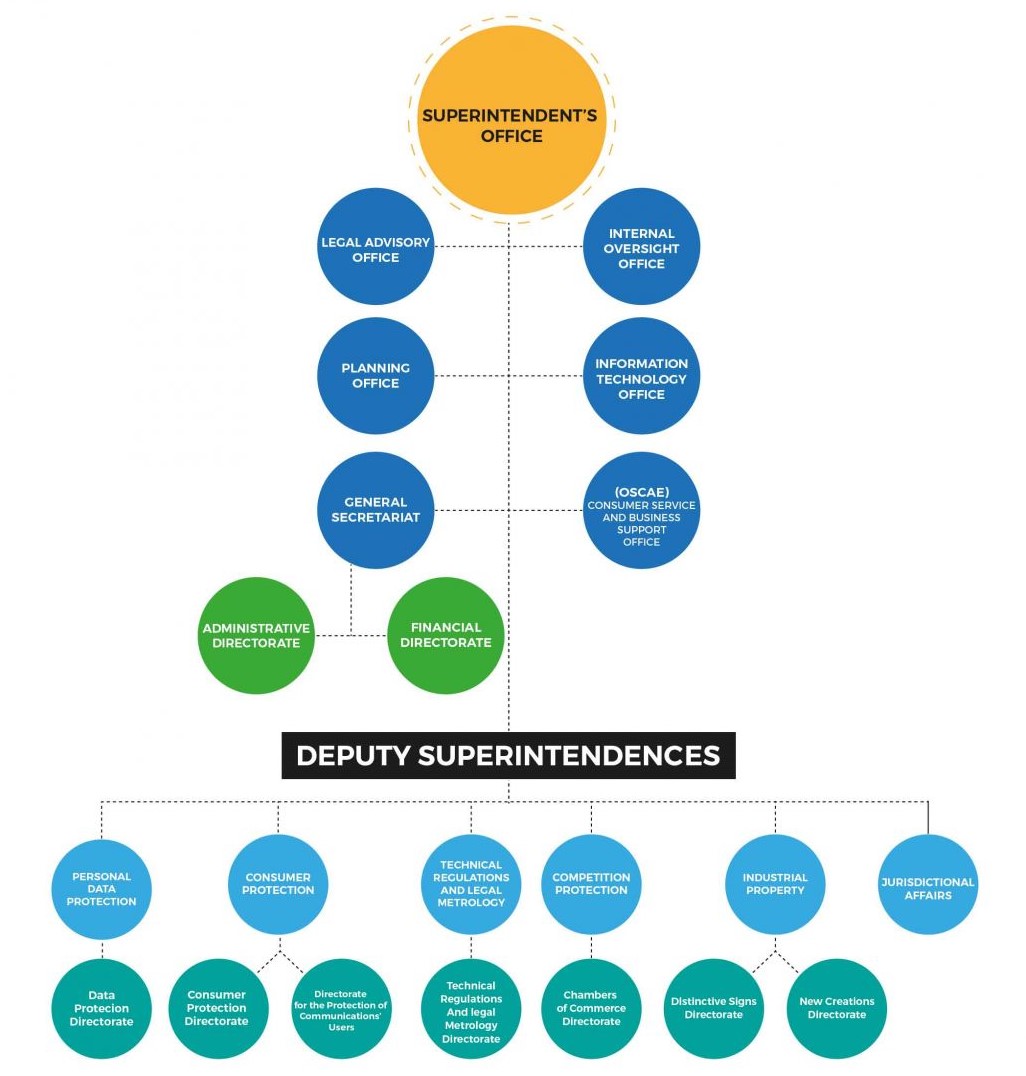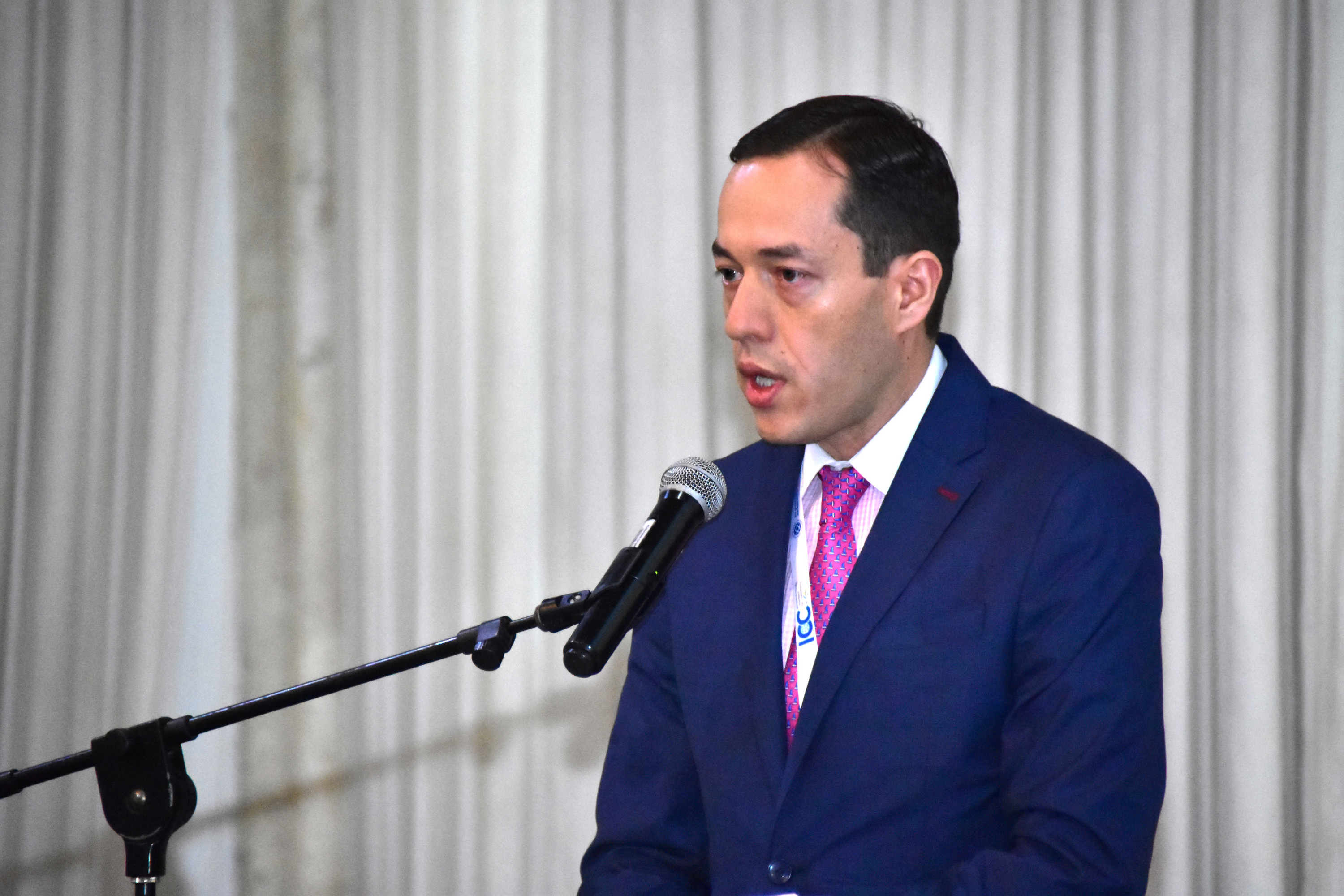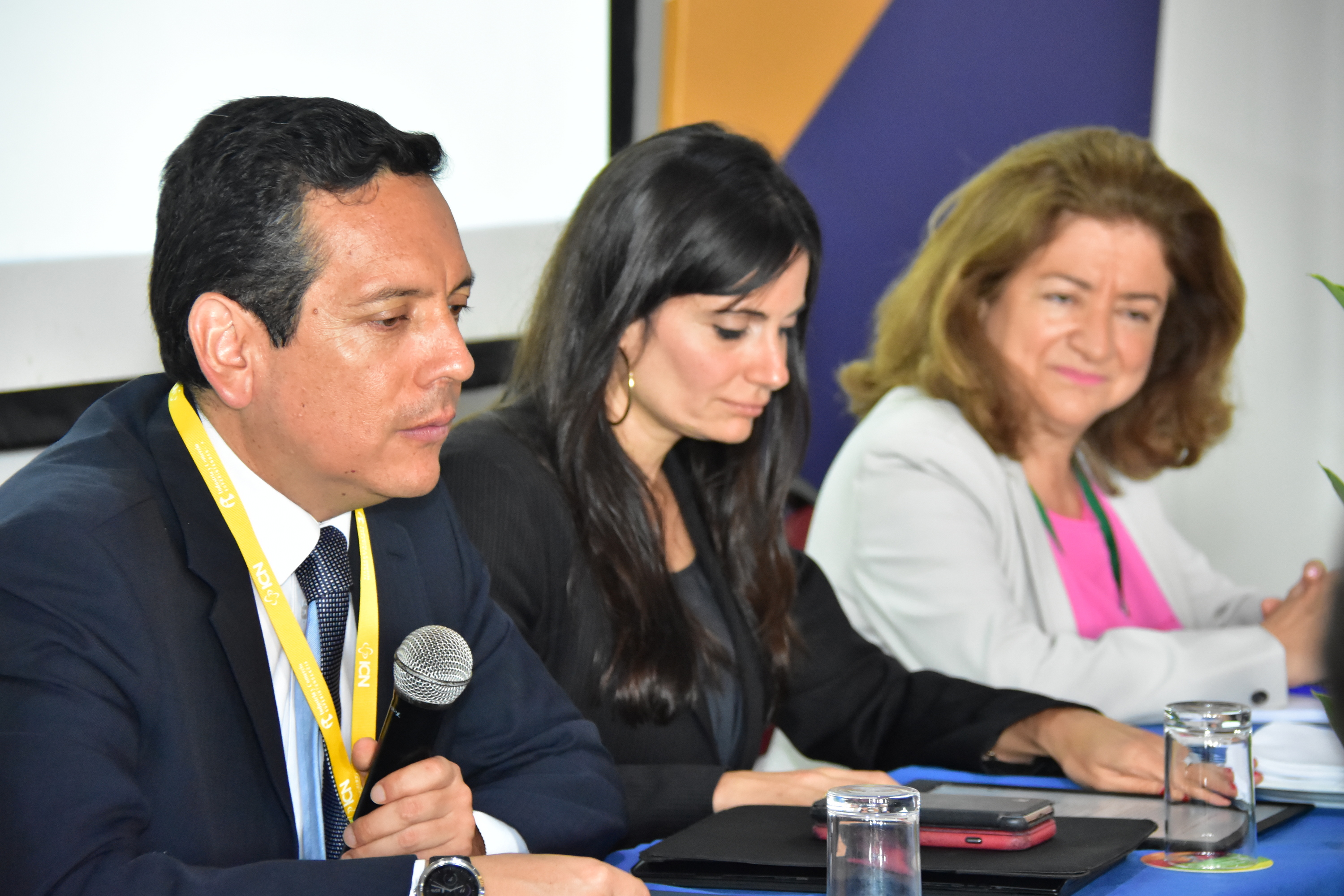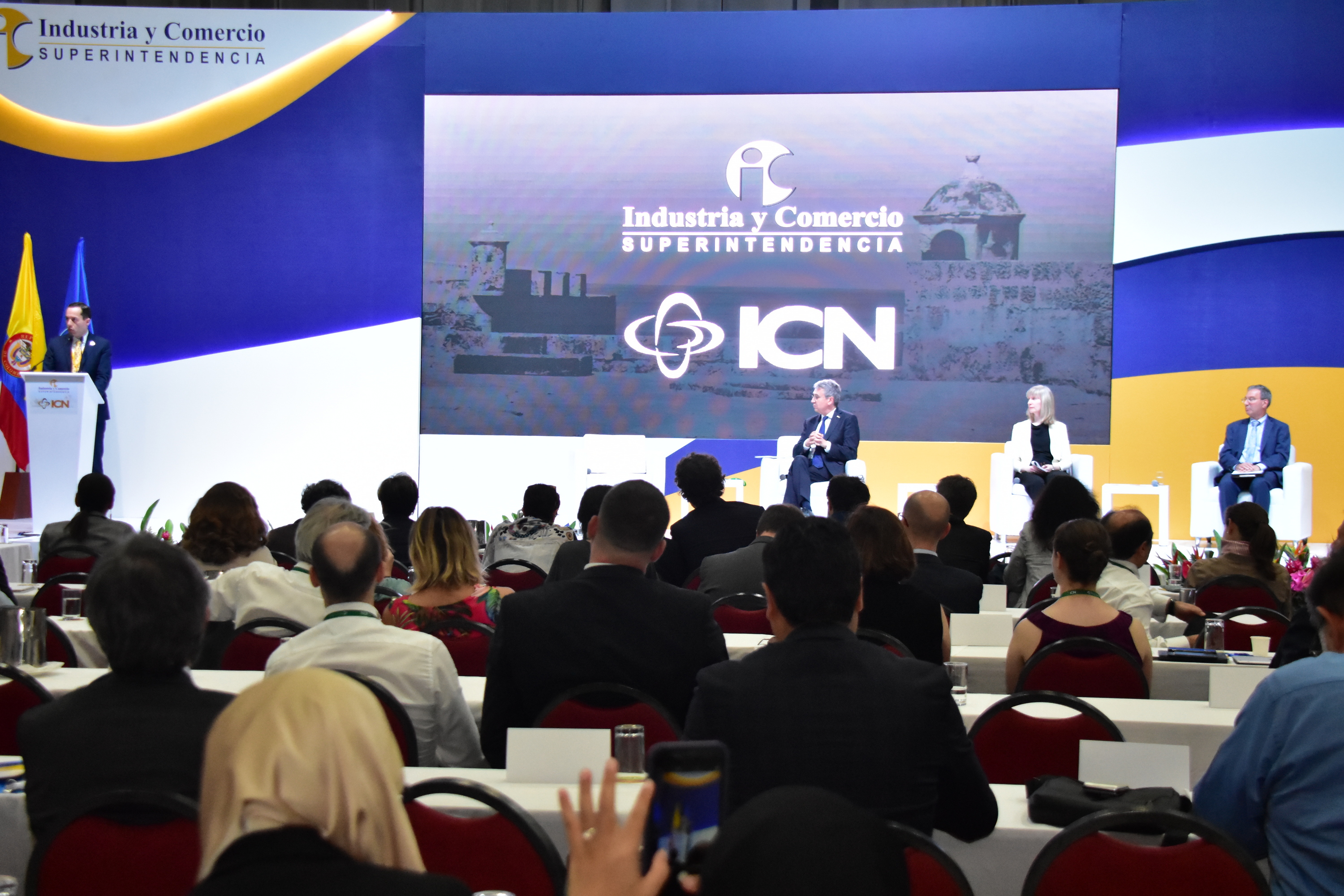Superintendence of Industry and Commerce
As the fourth largest economy in Latin America, Colombia is classified by the World Bank as an upper middle-income economy. The country became a member of the World Trade Organisation in 1995, and of the Organisation of Economic Co-operation and Development (OECD) in April 2020. According to OECD data, Colombia has been growing at an annual average rate of 4.3% between 2000 and 2019, versus 2.6% for Latin America. Its per capita GDP stands at US$16,091, and the middle class now accounts for about a third of the country’s population.
In addition to some of the world’s best coffee and music stars like Shakira, Colombia exports oil and commodities. Over half of the country’s total Foreign Direct Investment is in the oil and mining sectors, followed by manufacturing. Meanwhile, new activities like communications, consumer products and construction are increasingly attracting investment.
Mandate and organisation
In the 1880s, the Colombian law already prohibited the formation of corporations that exerted monopolistic control over basic commodities. It took decades before the concept of competition took hold, with the first Competition Law enacted in 1959 (Law 155/1959).
In 1968, the Superintendence of Industry and Commerce (SIC) was created as Colombia’s official competition agency, though with considerably less enforcement power than it has today.
The government's economic liberalisation policy in the 1990s prompted a more serious look at the importance of competition. The new Constitution formed in 1991, which established a right to free competition, was followed by a decree in 1992 that intended to modernise the competition law regime. Multiple regulatory commissions were given the power to competition enforcement, resulting in a decentralised institutional model.
Eventually in 2009, a new law (Law 1340/2009) consolidated the authority for competition enforcement in the SIC, which was also given additional mandate.
Organisation
Today, the SIC is a public authority and technical agency attached to the Ministry of Trade, Industry and Tourism, wielding administrative, financial and budgetary autonomy.
The SIC is organised into six principal divisions, or Deputy Superintendences, namely Competition Protection, Consumer Protection, Personal Data Protection, Industrial Property, Technical Regulation and Legal Metrology, and Judicial Affairs. Each division is headed by a Deputy Superintendent.
Fig. 1 Organisational chart of the SIC:

Role and functions
The duties of the SIC are established in Article 1 of Decree 4886 of 2011. Some of those directly related to competition are highlighted below:
- Advise the Government and participate in the formulation of policies on all matters in relation to promotion and protection of competition
- As the national competition authority, ensure compliance with legal provisions related to this area in national markets
- Conduct investigations into claims or complaints by events that affect competition in all markets, in particular those significant to achieve the following purposes: free participation of enterprises in the market, consumer welfare and economic efficiency
- Impose, based on the law and in accordance with the applicable procedure, penalties for the violation of any of the provisions of competition protection and unfair competition, and for not complying with instructions issued by the authority in discharging its functions
- Order, as a precautionary measure, the immediate suspension of conducts that may be contrary to provisions on competition protection and unfair competition
- Order the modification or termination of the conducts that contravene provisions on competition protection and unfair competition
- Grant benefits for collaborating with the SIC under the competition protection law
- Submit, when deemed appropriate, an ex-ante assessment opinion on State regulations that may have an effect on competition in the markets
- Decide, on the terms of law, mergers or acquisitions, whatever the economic sector or the legal form of the proposed transaction is
- Issue instructions on competition protection, establish the criteria to facilitate compliance and define the procedures for the law’s full application
Enforcement work
Colombia’s competition law prohibits “conducts affecting free competition” as specified in any of the laws constituting the competition regime. Those laws include provisions addressing agreements, abuse of dominance, other unilateral acts (i.e. acts that are undertaken by a single firm without regard to whether that firm holds a dominant position), and mergers, as well as Article 1 of the 1959 competition law (Law 155/1959), which serves as a catch-all for anti-competitive conduct not otherwise specified in the law regime. The core merger provision, which appears in Law 1340/2009, bars transactions that “tend to cause an undue restriction on free competition”.
The SIC can impose sanctions against business entities or individuals that have entered into anti-competitive conducts. Sanctions can take the form of monetary fines and orders requiring the modification or termination of conduct violating the law. The maximum fine per offense for business entities is the greater of 100,000 current legal minimum monthly wages (CLMMW) or 150% of the profits derived from the anticompetitive conduct. For individuals who collaborate, facilitate, authorize, execute or tolerate any conduct that violates the regulations on the protection of competition, the maximum fine per offense is 2,000 CLMMW.
Enforcement against bid rigging
A priority for the SIC, as for most other competition authorities, is to combat bid rigging, especially in public procurement. Bid rigging in public procurement was codified expressly as an anticompetitive conduct in 1992, and became a criminal offense in 2011. In 2012, the SIC created the Public Procurement Taskforce as a specialised team to fight collusion and other anti-competitive practices in public procurement. The taskforce was strengthened in 2017 with a bigger budget and staff.
From 2017 up to now, the SIC has imposed nearly US$ 41 million in sanction in relation to bid rigging in public procurement. The sectors covered include infrastructure, military rations, private security, school meals and pedagogic materials.
Four MOUs have been signed between the SIC and other national authorities (such as the Office of the Attorney General of Colombia) to cooperate in this area, mainly regarding the facilitation of information exchange. Recently, the SIC has organised two webinars for public servants of regional public entities to improve their knowledge on the subject.
Merger review activities
Under the law, parties to a transaction must inform the SIC of their projected transaction when they are engaged in the same economic activities (horizontal overlap) or the same value chain of a relevant market (vertical effect). Every year, the SIC establishes the operational income and assets above which companies are obliged to report a transaction prior to its execution. For 2019, the threshold was set at 60,000 CLMMW, or 49,686,960,000 COP (about US$15 million).
Two kinds of merger applications are reviewed by the SIC:
- Notifications: They apply to mergers whose concerned parties jointly hold less than 20% of market share. The parties only need to provide notice of the transaction to the SIC prior to the closing and the transaction is considered authorised.
- Pre-evaluations: They apply to mergers whose concerned parties jointly hold 20% or more of market share. This procedure involves two phases including an in-depth analysis, and may take two to nine months. The parties are subject to a standstill obligation, i.e. the transaction may not be closed before the SIC authorises it.
If a merger is considered to have an effect on the financial markets, the SIC releases a non-binding concept to the Colombian Superintendence of Finance, which will make the final decision regarding the merger in question.
The following shows mergers reviewed by the SIC from 2019 to November 2020:
| Year | Notifications | SFC Concepts |
Phase 1 pre-evaluations (approved) |
Phase 2 pre-evaluations | Desisted operations | TOTAL | ||
|---|---|---|---|---|---|---|---|---|
| Approved | Conditioned | Objected | ||||||
| 2019 | 145 | 12 | 25 | 16 | 2 | 1 | 0 | 201 |
| 2020 | 92 | 8 | 29 | 7 | 1 | 0 | 1 | 138 |
| Total | 237 | 20 | 54 | 23 | 3 | 1 | 1 | 339 |
Advocacy
The SIC undertakes its competition advocacy function mainly through three mechanisms: (i) provision of opinions regarding the effects on market competition of projects of administrative acts, (ii) analysis of the effects on market competition of draft laws at the requests of congress members and (iii) study of the effects on market competition of laws or public policies in response to requests of the Executive branch of the government.
Recent advocacy opinions issued by the SIC touched on such matters as the auction for the provision of electric energy from non-conventional renewable sources, the radioelectric spectrum auction, the study of the selection mechanism for the construction of a regasification plant in Colombia’s Pacific Coast, and the implementation of measures to benefit local producers offering foods through public tenders. The last two opinions were developed as part of the ex officio function of the competition authority.
As for the public tender to select an investor to develop the infrastructure required to provide liquefied natural gas services, the SIC highlighted several important issues such as limiting the contractor’s capability of modifying delivery date of the project, considering mechanisms to reduce exchange rate risk which otherwise could harm consumers, and limiting the participation of third parties in the public tender. In the case of public purchases of food, the SIC recommended the Ministry of Agriculture and Rural Development to limit the amount of information participants had to make public and eliminate differential measures benefiting producers using the public service of agricultural extension or growing crops in accordance with the guidance provided by Colombia’s Agricultural and Livestock Rural Planification Agency.
International cooperation
Starting from 2020, the SIC is co-chairing the International Competition Network's (ICN) Advocacy Working Group with the Hong Kong Competition Commission and the Norwegian Competition Authority. The mission of the Working Group is "to improve the effectiveness of ICN members in advocating the dissemination of competition principles and to promote the development of a competition culture". The SIC is committed to representing Colombia in the best possible way in the international arena.
The SIC also participates in the OECD’s Competition Committee and Consumer Protection Committee, in their corresponding working parties. In both committees, the SIC represents Colombia and serves as a link between the OECD's guidelines and Colombia's process of adjustment.
Recently, Colombia has entered into a cooperation agreement with Mexico and Ecuador to promote institutional cooperation and information exchange in the area of competition protection.
Digitalisation of investigative tools
Facing challenges posed by the development of new markets in the digital world, as well as the large volume of data that needs to be analysed, the SIC has stepped up its efforts to utilise data analytics tools and technologies and to promote digitalisation of investigative tools through three pilot projects:
- Sabueso Project: Its objective is to create a set of tools that help the Deputy Superintendence for Competition Protection monitor and analyse information of products available on retail websites, so as to provide information that would otherwise be difficult to obtain in an agile and timely manner.
- Sherlock Project: This initiative seeks to help investigators from the SIC identify indicative patterns of possible contraventions within public procurement. This project has 2 stages: the first includes the creation of a tool aimed at facilitating access to the data available online on public procurement; the second poses a greater challenge – it is created to send alarms to investigators of possible anticompetitive conducts within public purchasing that are off the radar of the Deputy Superintendence for Competition Protection.
- Inspector Project: This project monitors the regulatory projects published on the websites of state regulatory agents. If changes are detected in the published regulations, the system automatically sends an alert to the SIC informing the news.
Response to COVID-19
In response to difficulties regarding documents handling caused by the pandemic, the SIC has digitised all of the files on the administrative investigations carried out by the Competition Protection division. Such information was mostly handled physically prior to COVID-19.
In terms of enforcement, 220 requests for information and 82 virtual interviews have been carried out to investigate conduct which might restrict competition, in particular, unfair prices. Two investigations were opened to look into alleged behaviours that violate the Free Competition Regime provided by resolutions No. 19922 and 25183 of 2020.
Since public spending tends to increase during a pandemic, the SIC has stepped up surveillance of public procurements, resulting in 57 requests and 11 interviews for alleged collusive practices in mayors and governorates. The competition authority also organised two trainings in collaboration with the Federation of Departments and the Federation of Municipalities aimed at all mayors and governorates of the national territory to raise their awareness of the importance of compliance with the Free Competition Regime and the consequences of its violation.
Regionally, the SIC joined other agencies in Latin America and the Caribbean to share experiences in relation to the measures for handling the challenges posed by the pandemic to competition.
Future priorities
Detecting anti-competitive conduct in public procurement will continue to be a priority for the SIC. As mentioned, the SIC is working on three pilot projects that would help strengthen its investigation capacity in this area.
As the agency continues to develop strategies with the aim of creating and promoting a culture of competition, the priorities for 2021 in competition advocacy will be to develop sectoral studies and conduct advocacy campaigns.
As for merger control, the SIC will analyse acquisitions carried out during the contractionary phase of the economy, and review its economic analysis methodologies during the coming years.
The agency will also continue to collaborate with overseas counterparts with the aim of enhancing capacity building and developing efficient investigation strategies.
(Published in February 2021)




